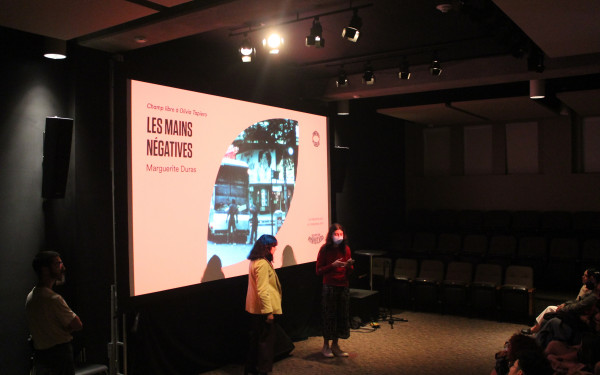Fantasia Feature Films: The Highlights
Concordia Welcomes Montreal’s Genre Film Festival for the Twenty-Third Year
From the worldwide premiere of Aquaslash, an indie Montreal slasher movie to House of Hummingbird, a mesmerizing Korean coming-of-age story, here are three screenings that stood out in this year’s Fantasia International Film Festival.
Proving that genre films are also capable of gorgeous images, pure emotion, and originality, Fantasia’s 2019 lineup surprised with its diversity and relevance. It was held at the downtown campus of Concordia, between July 11 and Aug. 1.
Aquaslash by Renaud Gauthier. Canada.
Of all the films premiering at Fantasia this summer, Aquaslash is one that encompasses the festival’s role, promoting the vitality and possibilities of genre cinema.
The film’s director Renaud Gauthier said it himself, on stage, after the screening on July 29: “This is film is a mix of genres.” Blending satire and his experience of “growing up in Montreal in the 1980’s,” the movie lives up to its title.
Shot in Pointe-Calumet, it relates the misadventures of very stereotyped high-schoolers, celebrating their graduation at a water-park. Loyal to the slasher genre, the park has a mysterious murder history that resurfaces as the kids start sensing they might be in danger.
The event of the screening itself was even more exciting than the film. Filling the SGWU Alumni Auditorium, Aquaslash managed to provoke applause and laughter from the crowd in almost every scene.
The final version of the movie wasn’t shown—there were still colourization and special effects corrections to be made. Knowing that this was the director’s cut and that the distributor would shorten the film because it was too “artsy,” in Gauthier’s words, was a good consolation prize.
Even if it lacked the visual quality of a finished movie, and despite the bad rendering of a 1980s atmosphere and the often corny dialogue, seeing Aquaslash at Fantasia was a pleasant experience. Gauthier knows how to make a good slasher-comedy without taking himself too seriously.
House of Hummingbird by Kim Bora. South Korea.
“This is probably the best coming-of-age film I’ve seen in my entire life,” —Nicolas Archambault
“This is the best film of all this year’s edition,” said Nicolas Archambault, director of the Asian cinema programming, before the screening of House of Hummingbird on July 24.
“This is probably the best coming-of-age film I’ve seen in my entire life,” he later added. Needless to say, there was much hype around Kim Bora’s first feature film.
What is most striking about House of Hummingbird, is the way it poeticizes its characters’ lives and their surroundings, while being perfectly realistic and credible.
It is anchored in the uneasy realities of a very competitive South Korean society that seems all the more difficult for teenagers, juggling their impossible school schedules and tremendous pressure from their parents. From that difficult environment which is rarely shown on our big screens, Bora has extracted beauty.
The over two hour drama follows Eun-hee, a 14-year-old student, around her school and her parent’s apartment tower, in the 1990s. Park ji-hu, the young actress who plays her, is remarkable.
Her personal and moving performance evolves through the story. First appearing shy, often afraid of her own parents and her brother who beats her, she learns how to overcome the challenges of her family life and friendships through the help of her Mandarin teacher.
Although House of Hummingbird is set in Seoul, a loud and busy environment, it always feels so gentle and calm, with its graceful images of leaves, parks, water, and the prevalence of closeups on both nature and the characters.
Jessica Forever by Caroline Poggi and Jonathan Vinel. France.
Another alluring feature film debut, which had its Quebec premiere at Fantasia on July 26, is Jessica Forever. Poggi and Vinel are up-and-coming creators, representative of what seems to be a new generation of French cinema, along with their collaborators Bertrand Mandico and Yann Gonzalez. Their filmmaking is so unique and codified, it seems as though they have created a genre for themselves.
With a neon and surrealist aesthetic, sexual ambiguity, queer subjects, and an aura of mystery, their films give hope about new French cinema and the possibilities of a contemporary approach to surrealism.
Jessica Forever is centered around an army of 11 young men, all orphans, led by Jessica, who becomes the mother of their new family and the central figure in their lives. Set in a dystopian suburb in an unknown country, in another world, it tells the story of how the young men came from being dangerous criminals to venerate Jessica and quit their violent lives, while still being chased by the police.
The film beautifully blends social commentary, sensuality, seduction, and action scenes.
It starts with the youngest of the group, Kevin, being rescued by Jessica. We then follow them to their headquarters, and watch the group bond with one another, fight for their lives, fall in love, and grief.





__thumb_600_375_90_s_c1.JPG)
